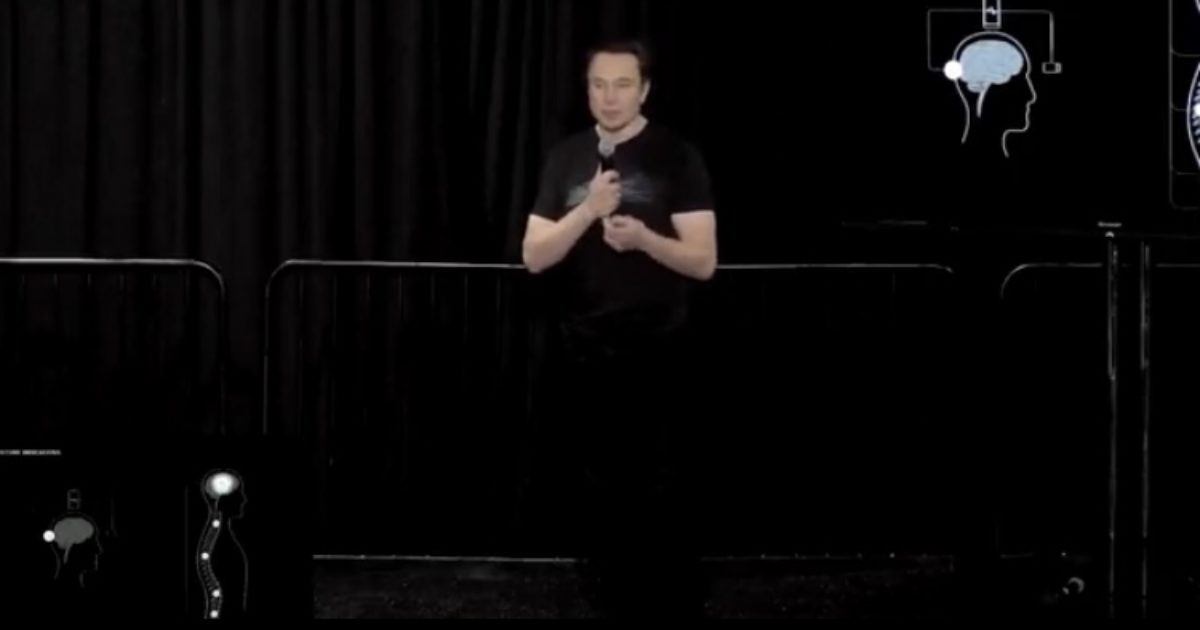Elon Musk announced at a live-streamed event on Wednesday that Neuralink Corp’s brain chip could be implanted in human heads for clinical trials within the next six months.
“We want to be extremely careful and certain that it will work well before putting a device into a human, but we’ve submitted, I think, most of our paperwork to the FDA, and probably in about six months, we should be able to upload Neuralink in a human,” Musk said during the event at the company’s headquarters in Fremont, California.
“We are now confident that the Neuralink device is ready for humans, so timing is a function of working through the FDA approval process,” Musk tweeted on Wednesday.
We are now confident that the Neuralink device is ready for humans, so timing is a function of working through the FDA approval process
— Elon Musk (@elonmusk) December 1, 2022
Zero Hedge reported:
Neuralink’s brain-computer interface (BCI) is a small chip implanted in a human’s head to allow a person suffering from a debilitating condition, such as the aftereffects of a stroke or amyotrophic lateral sclerosis (ALS), to communicate with their thoughts.
Previously, Musk had promised human trials would begin in 2020, then 2022, and now the target appears sometime in the first half of 2023. He also revealed two other BCIs that could one day be attached to the spinal cord and restore movement in someone with paralysis.
“As miraculous as that may sound, we are confident that it is possible to restore full-body functionality to someone who has a severed spinal cord,” the billionaire co-founder said.
One of the presentation’s highlights was a video of a monkey “telepathically typing” on a screen with a BCI implant.
“To be clear, he’s not actually using a keyboard … He’s moving the cursor with his mind to the highlighted key. Now technically, he can’t actually spell. So I don’t wanna oversell this thing, because that’s the next version.”
Monkey plays pong with his mind using Neuralink pic.twitter.com/pAwP791b0S
— Whole Mars Catalog (@WholeMarsBlog) December 1, 2022
Elon Musk's Neuralink aims to start putting its coin-sized brain implant into human patients within six months.
In this Neuralink video, Musk shows how the product works with a monkey “telepathically typing” on a screen in front of it. More here:https://t.co/gB2z6NITXu pic.twitter.com/wWnMltw1TU
— Bloomberg (@business) December 1, 2022
Musk previously discussed the potential medical breakthroughs of the Neuralink brain chip technology:
Elon Musk has high hopes for his brain chip company #neuralink. Here's one 'miraculous' future prediction: pic.twitter.com/7VM4JU7iwR
— Newsthink (@Newsthink) December 1, 2022
Elon Musk neuralink brain chip! 😬 #elon pic.twitter.com/6RUMYpMNHV
— Jorge Heathen (@HeathenFam) November 22, 2022
However, this technology, in the wrong hands, could lead to catastrophic consequences for humanity.
How can we be sure this technology will not be weaponized against humanity to enslave us?
NEW: @elonmusk Says Neuralink Will Make The Blind See & The Handicapped Walk Again!
While This Would Be The Most Incredible Medical Breakthrough In History!
My Question For Elon Is…
How Can We Be Sure This Tech Will Not Be Weaponized & Used Against Humanity To Enslave Us? pic.twitter.com/egzqQUi7nH
— Spiro (@Spiro_Ghost) December 1, 2022
Bloomberg added:
Neuralink has been refining the product, which consists of a tiny device and electrode-laced wires, along with a robot that carves out a piece of a person’s skull and implants it into the brain. Ongoing discussions with the US Food and Drug Administration have gone well enough for the company to set a target of its first human trials within the next six months, according to Musk.
In typical fashion for an Elon Musk venture, Neuralink is already bounding ahead, aiming implants at other parts of the body. During the event, Musk revealed work on two major products in addition to the brain-computer interface. It’s developing implants that can go into the spinal cord and potentially restore movement in someone suffering from paralysis. And it has an ocular implant meant to improve or restore human vision.
“As miraculous as that may sound, we are confident that it is possible to restore full-body functionality to someone who has a severed spinal cord,” Musk said at the event. Turning to Neuralink’s vision work, he added that “even if they have never seen before, we are confident they could see.”
The goal of the brain-computer interface, known as a BCI, is initially to allow a person with a debilitating condition — such as amyotrophic lateral sclerosis (ALS) or suffering the aftereffects of a stroke — to communicate via their thoughts. The company demonstrated that with a monkey “telepathically typing” on a screen in front of it. The Neuralink device translates neuronal spikes into data that can be interpreted by a computer. Musk’s hope is that the device could one day become mainstream and allow for the transfer of information between humans and machines. He has long argued that humans can only keep up with the advances being made by artificial intelligence with the help of computer-like augmentations.
“You are so used to being a de-facto cyborg,” Musk said. “But if you’re interacting with your phone, you’re limited.”
As has been the case with past Neuralink events, some of the things demonstrated by Musk and his team have already been accomplished in academic settings. The company’s critics have long accused Musk of overhyping Neuralink’s advances and over-promising what the technology will be able to do in the near future, if ever.
Brain-machine interface technology has been researched and advanced by academia for decades. Musk’s entry into the arena, however, has spurred a wave of investment from venture capitalists into startups and helped push the field forward at a much more rapid clip.
Watch the full Neuralink livestream below:



Join the conversation!
Please share your thoughts about this article below. We value your opinions, and would love to see you add to the discussion!